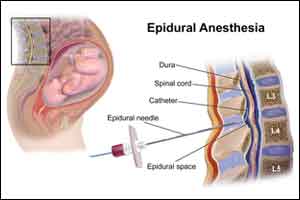- Home
- Editorial
- News
- Practice Guidelines
- Anesthesiology Guidelines
- Cancer Guidelines
- Cardiac Sciences Guidelines
- Critical Care Guidelines
- Dentistry Guidelines
- Dermatology Guidelines
- Diabetes and Endo Guidelines
- Diagnostics Guidelines
- ENT Guidelines
- Featured Practice Guidelines
- Gastroenterology Guidelines
- Geriatrics Guidelines
- Medicine Guidelines
- Nephrology Guidelines
- Neurosciences Guidelines
- Obs and Gynae Guidelines
- Ophthalmology Guidelines
- Orthopaedics Guidelines
- Paediatrics Guidelines
- Psychiatry Guidelines
- Pulmonology Guidelines
- Radiology Guidelines
- Surgery Guidelines
- Urology Guidelines
Epidural analgesia doesn't slow second stage of labor : Study

Epidural analgesia - a mix of anesthetics and narcotics delivered by catheter placed close to the nerves of the spine - is the most effective method of labor pain relief. In widespread use since the 1970s, epidurals have long been thought to slow the second stage of labor - defined as beginning when the cervix is completely dilated and ending when the baby is delivered. Because a longer duration of this stage of labor is associated with adverse outcomes, obstetricians routinely reduce or discontinue epidural pain management in an effort to expedite this main stage of labor.
That practice could be out-of-date and misguided, according to research led by scientists at Beth Israel Deaconess Medical Center (BIDMC). A paper published today in the journal Obstetrics & Gynecology demonstrated that epidural medication had no effect on the duration of the second stage of labor, normal vaginal delivery rate, incidence of episiotomy, the position of the fetus at birth or any other measure of fetal well-being the researchers investigated. The study compared the effects of catheter-infused, low-concentration epidural anesthetic to a catheter-infused saline placebo in this double-blinded, randomized trial of 400 women.
"We found that exchanging the epidural anesthetic with a saline placebo made no difference in the duration of the second stage of labor," said senior author Philip E. Hess, MD, Director of Obstetric Anesthesia at BIDMC and Associate Professor of Anaesthesia and of Obstetrics at Harvard Medical School. "Not even the pain scores were statistically different between groups. However, pain scores in women receiving the saline placebo increased over time, as would be expected."
The study enrolled healthy, first-time mothers who were provided with a patient-controlled epidural analgesic pump in the first stage of labor. All mothers were given active pain medication during this early stage of labor.
When they reached the second stage of labor, participants were randomized to receive either the active anesthetic (low doses of the drugs ropivacaine and sufentanil) or the saline placebo. In this stage of labor, none of the mothers, investigators, obstetricians or midwives knew whether the catheter-delivered infusions contained the active pain medication or the saline placebo in this double-blind clinical trial.
Women in excessive pain were given unblinded doses of the active pain medication at their doctors' discretion and doctors could also terminate epidural infusions at any time based on clinical indicators.
The primary outcome, the duration of the second stage of labor, was similar between both groups: about 52 minutes for women given active pain medication versus about 51 minutes for women given the saline - just a 3.3 percent difference. The median times were also similar: 45 minutes for women on active pain medication versus 46 for those on saline. Of note, obstetricians requested to stop epidural infusions in 38 patients for poor progression of labor. Of these, 17 of the women were in the saline group. Twenty-one were in the active medication group.
In addition to the duration of the second stage of labor, Hess and his colleagues looked at a variety of outcomes measuring fetal health and well-being, such as birth weight, Apgar scores - a quick measure of fetal health taken minutes after birth - and umbilical artery pH, a metric for assessing fetal blood oxygen levels. The team also compared patient-reported pain scores and patient satisfaction with pain control measures.
"Twice as many women given the placebo reported lower satisfaction with their pain relief compared to those provided the anesthetic," said Hess. "Ethically, if epidural medications result in a negative effect on the second stage of labor, one could argue that a mild increase in maternal pain could be balanced by a successful vaginal delivery. We didn't see any negative effects, but epidural analgesia in the second stage of labor remains controversial and merits follow up studies."

Disclaimer: This site is primarily intended for healthcare professionals. Any content/information on this website does not replace the advice of medical and/or health professionals and should not be construed as medical/diagnostic advice/endorsement or prescription. Use of this site is subject to our terms of use, privacy policy, advertisement policy. © 2020 Minerva Medical Treatment Pvt Ltd